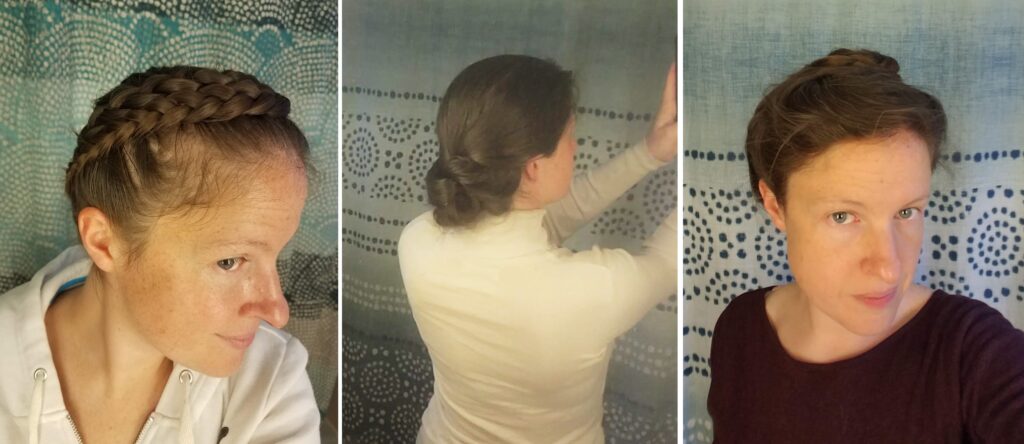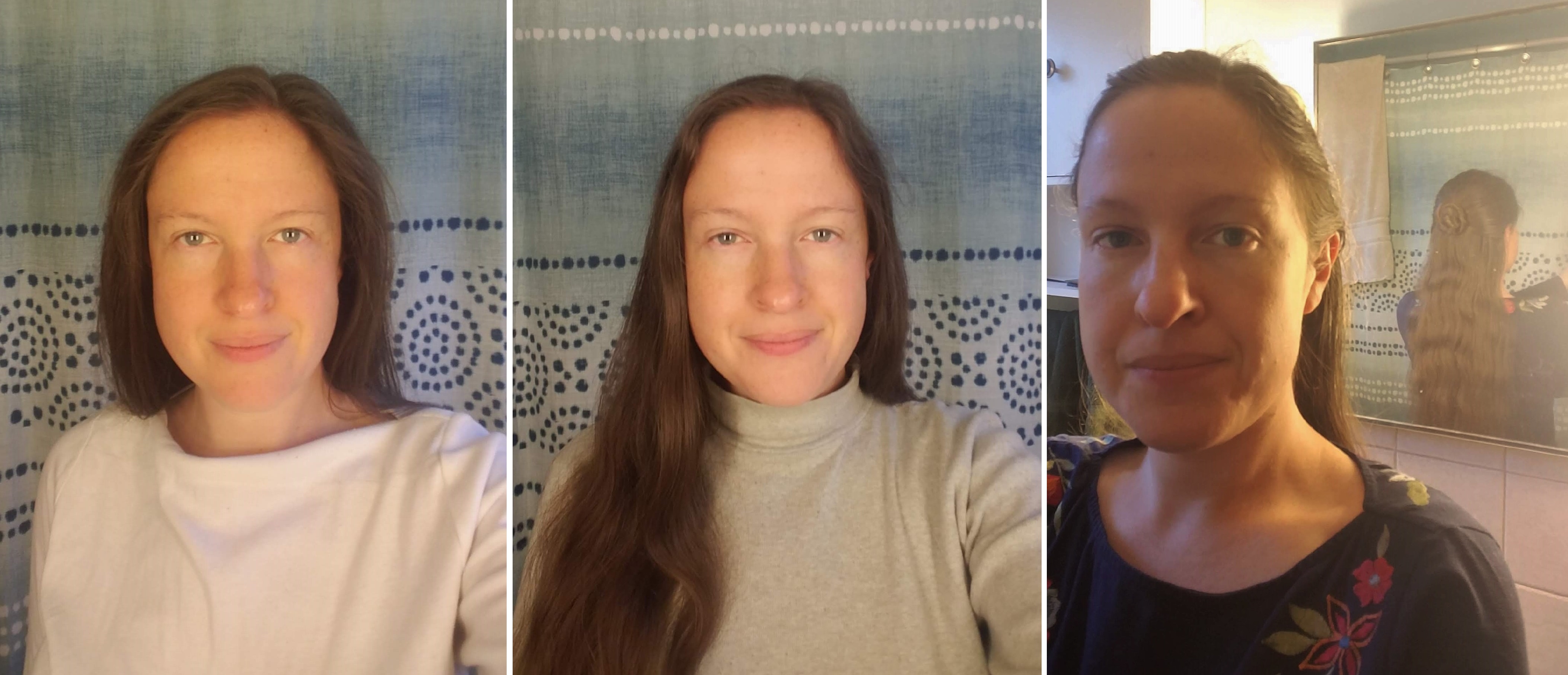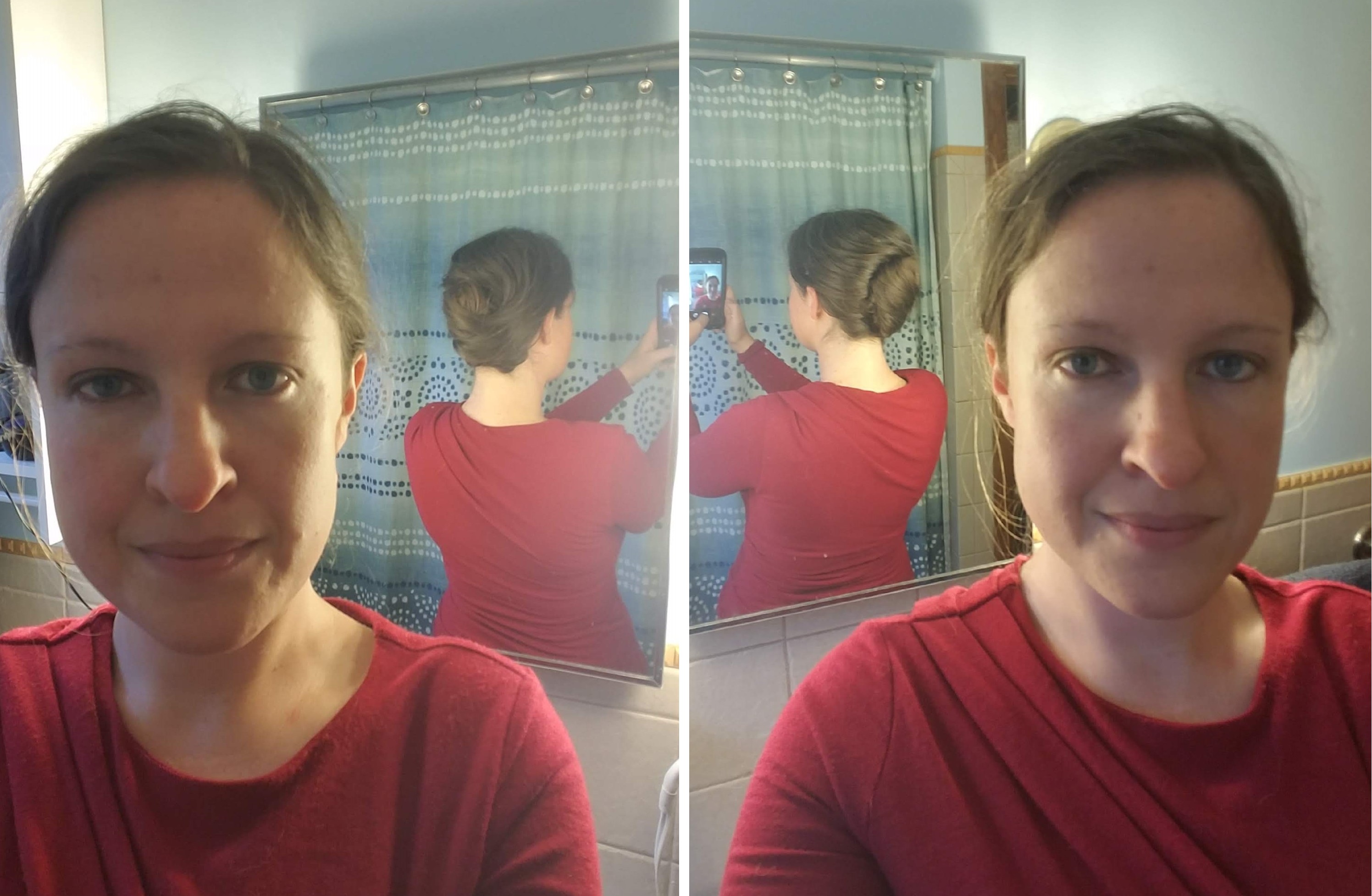About two years ago I wrote a blog post about a hair care regimen that was trending at the time: the No Shampoo Challenge.[1] The idea behind this popular six-week challenge was to cut out the surfactants and polymers found in standard hair care products, thus allowing your scalp’s natural oils to keep your hair healthy. In a previous post I detailed my own experience with the “No Poo” method,[2] as it was coined; in this post I will talk about what I’ve learned about my hair in the subsequent two-plus years without shampoo.
When I say I haven’t used shampoo on my hair in over two years, I mean just that. I have also not used baking soda, vinegar, dry shampoo, baby powder, or any other soap alternatives. All I do is rinse my hair thoroughly (vigorously at the scalp) at least once a week and blow-dry it or air-dry it afterwards. Typically I will braid it or put it in a bun because wearing it straight down only really works for the first day or two. Yes, quarantine has most certainly helped encourage this routine, but as I’ve spent more time back in the office over the past few months, I’ve only been doing more hair styling, not more washing.
A Few Things to Consider…
First, I’ll say that I’ve had several friends try this challenge by essentially going from zero to 60: from shampooing every day to not at all. As someone who couldn’t go one day without shampooing her hair (about six years ago), I can’t imagine how bad I would have looked and how quickly I would have abandoned the challenge. For a few years, I had already been slowly extending the length of time between washes, starting from every other day and gradually making it to once a week (as they did in my mother’s generation) or every few weeks (as they did in my grandmother’s generation) by the time I started the challenge. I think that made a big difference with my experience.

Second, everyone’s head is different. Depending on your scalp, hair type, and how much oil your body produces, you’re going to have a different experience. I am not saying that everyone has to do exactly what I did, or that everyone will have the same outcome. I am saying that I have fine, limp, long hair, none of which lends itself well to this challenge, and I have been pleasantly surprised with the results. Conversely, I have friends with thick, strong hair, which should be great for this challenge, and they have not all had good experiences.
Third, my reasons for continuing this challenge are many, and hair health is pretty low on the list. My stylist (who has been my stylist for more than half my life, but whom I don’t see too much these days) said there’s really not much of an added benefit from washing your hair less often than once a week or so. I’ve continued with this challenge for so long not because I think that going without shampoo for longer will be healthier, but more because I’m saving time, money, water, gas, electricity, plastic, and effort. Plus, I’ve just been curious to see what will happen.
If you’ve got questions about your own scalp/hair needs, you can always talk to a dermatologist or a trusted stylist. As I learned very quickly when writing my last post, online research on this subject will largely result in information on traditional shampoo alternatives to buy, not necessarily useful information about how (or why) to stop using shampoo. In any situation (not just this one) always remember to ask yourself “who is sharing this information?” and “are they trying to sell me something?” Cutting back on consumption is not the American way, so you’re not likely to find someone just telling you to use less – except me, of course.
Historical Basis
This blog is partly about conservation and partly about experimental research, and what I’ve done (or not done) with my hair over the past two years is a great example of both… but there was an added bonus here for my inner history nerd. Since high school, I’ve loved studying the clothing of different time periods (particularly the middle ages), but I have found other aspects of daily life at various points throughout history fascinating as well, including what people did with their hair.

Granted, hair styles over the centuries have been largely influenced by what hair care products were available at the time (e.g. braids or buns in the days before shampoo vs. flowing, feathered Farrah Fawcett hair in the time of daily shampooing). For that reason, it’s not really feasible to get perfect, modern styles without modern products. However, by incorporating some historical, pre-shampoo techniques, I’ve been able to continue with this challenge without looking sloppy.
As I mentioned in the last post, since my hair was getting longer, I was finally teaching myself how to braid my own hair. It would take me about 45 minutes to do some more complex styles (like a Dutch braid around my head), but then I could leave my hair up for most of the week and not have to deal with it again. It seemed like a good trade-off to have one big time investment followed by zero maintenance for several days. My braids would start to get a little fuzzy after a few days of activity and a few nights of sleeping on them, but by not really messing with my hair or brushing it, I could save a bunch of time and stave off the greasy look for at least a little bit.
However, I was surprised to learn (rather recently) that women in the middle ages did not braid their hair once, leave it for a few days, and throw a veil over it (as I do when camping at medieval events). They, in fact, combed out their hair twice a day as a method of cleaning and conditioning it. A fine-tooth comb will distribute oils from the scalp through the length of the hair, keeping the top from getting oily and the ends from getting dry (which was always the problem I encountered). This practice was the basis for the ritual of brushing one’s hair with 100 strokes (as I once saw Mary Tyler Moore do on TV), which I always thought of as vain and arbitrary.[3]

In Practice
If I didn’t have time to do a daily extravagant hair braiding session before, I certainly wasn’t going to start now. I was curious, however, what the process of combing out my hair twice a day would do to its appearance, and whether that would help achieve a better look with more modern styles. And when I say “more modern,” I mean something professional like a low bun or even more of an Edwardian look with my hair piled on top of my head,[4] rather than the braids I might wear to a medieval reenactment.[5]
My hair is about waist length now, meaning that combing 100 strokes from root to tip, while being careful not to rip through tangles, takes me between four and five minutes. As I said before, I am lazy when it comes to hair care, so I do not do this step every day (let alone twice a day), but I know that I can because I did for a week for the purpose of writing this post. I was surprisingly pleased with the results.
I usually wash my hair on Monday morning, and I’m usually in a rather severe-looking French braid by Friday because it’s greasy enough that there’s nothing else I can do with it. But during the week in question, thanks to the act of combing for five minutes every morning and night, I was able to wear my hair down more often, including in half-bun on Friday, and I didn’t even need to wash it before putting it into a loose French roll for a red carpet event on Saturday.
For me, less effort is always preferable, but I do recognize that some effort is necessary to walk out my door, and a little more than that is necessary in a professional setting. I have no end goal or timeline with this self-imposed “challenge,” and I haven’t sworn off shampoo for the rest of my life, but I have been intrigued by the process of seeing how long I could manage without it. Although messing with my hair isn’t something I want to do every day, I have found it enjoyable learning how to do different hairstyles, particularly those that work in the absence of shampoo.

Ultimately, as I usually conclude on this blog, the answer comes down to what works for you. I would love to hear about your own experiences if you’ve cut down on shampoo and how you’ve adjusted your routine.
Thanks for reading!
[1] https://radicalmoderate.online/how-often-do-you-really-have-to-wash-your-hair/
[2] https://www.nopoomethod.com/
[3] https://www.youtube.com/watch?v=HwNLXeCVVXo
[4] https://www.youtube.com/watch?v=m065vzR3Ka4
[5] https://www.youtube.com/watch?v=dpT86z93Ec8
0 Comments